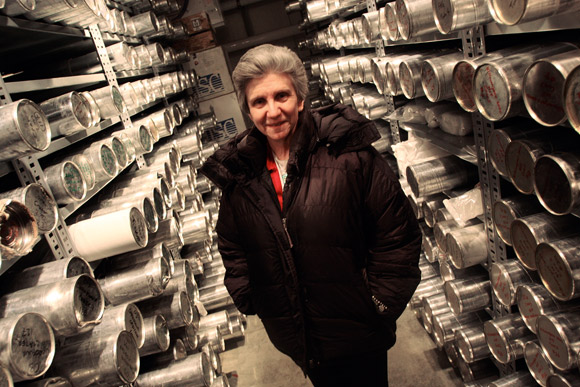Q&A: Byrd Polar Research Center's Mosley-Thompson describes center's role at 50

The Center is celebrating 50 years. What big breakthroughs have researchers made in that time?
In the late '70s one of our researchers, John Mercer, published a paper that said one of the first places we will see the evidence of human-driven warming will be the Antarctic peninsula. And we will see those ice shelves start breaking up. And they will start breaking up in the northern part of the peninsula and they will march southward. And that's exactly what we're seeing. The Polar Meteorology Group has taken the NCAR (National Center for Atmospheric Research) community climate model and adapted it to accommodate the processes that are dominant in the polar regions. Their models are used for projections of how precipitation over the Antarctic ice sheet is likely to change under a warming scenario. That's important for sea level rise. One of the things our group has done is to propel ice coring out of the polar regions into the world's highest glaciers. And David Elliot of our geology group found the very first fossil found in Antarctica.
What can ice cores tell us?
Anything that comes down on the ice sheet within the snow, or anything that falls out of the atmosphere onto the surface, or is in the atmosphere as the snow is densified . . . as the snow is slowly compressed into ice, even parcels of ancient air are trapped in bubbles. So we can reconstruct volcanic history, we can measure any chemical constituent that was in the atmosphere at that time. Probably the two most important parameters that we extract from ice cores is the gas history -- the history of the composition of the earth's atmosphere. The second is the oxygen and hydrogen isotopic ratio. It provides our very best tracer of past temperature. If you step back and you simply look at the trends, you can pick out very easily when the earth was warm and when the earth was cool.
How does ice core research help us deal with the problems we have today?
The power of these types of records is that the last 140, 150 years, that's our meteorological observation period. Before that, we have to rely on tree ring records, coral records, pollen histories, cores drilled in the oceans, cores drilled in lakes, cores drilled into (stalactites and stalagmites) and ice cores. We know that in the last 100 years human activities have had a major impact on the planet. There is, at this point, no longer any debate about whether the earth is warming, though there are still climate deniers who want to confuse the public. Where there is still room for good, scientific discussion is how much of that warming is driven by natural causes and how much of that is human-produced. The longest ice core record extracted to date goes back 800,000 years. So we have nearly a million year history of CO2, never rising above 300 parts per million in nearly a million years, and virtually in one century we have increased it to nearly 390 parts per million. This is a rapid event.
Why do you think there's so much contention over climate change?
It's literally driven by politics. And people don't like change. No one wants to think about having to change their lifestyle -- although, if you think about it, a lot of the things we as individuals might do don't necessarily have to mean any diminishment in the quality of our life. The best scientific knowledge that we have, and we know it's imperfect, says that there's a serious problem and we need to get going on this problem or we have a 90 percent chance that some very bad things are going to happen in the next century.
Have we made any environmental progress at all? The smog in LA is better.
Air pollution is a lot easier to get a handle on than some of the others. It's more short term. CO2 is so pervasive, it's in all our major fuels. And what people forget is carbon dioxide stays in the atmosphere 70 to 100 years. So, even if we could shut down all CO2 today, the earth already has about a half a degree of warming left that it's going to have to experience. And we know that in a thousand years, 19 percent of the CO2 emitted today will still be in the atmosphere.
Is it too late to do something about it?
No, and you can't send that message! You cannot give in and you cannot say it's insurmountable. People have to step up and realize we do have a lot of alternatives. The earth is going to get warmer and the sea levels are going to rise. Places that are dry are probably gong to get drier, places that are wet might get wetter. We know that agriculture will suffer. Efforts to mitigate or reduce emissions of CO2 have got to go on, and we've got to get on track with this faster, but we've got to shift some of our emphasis to adapting. How are we going to adapt to a warmer world?
Is there anything going on here at the center right now that especially that excites you?
From my group's
0 Comments:
Post a Comment
Subscribe to Post Comments [Atom]
<< Home